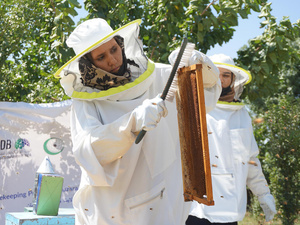Afghan refugee psychiatrist offering care in local community in Pakistan

Afghan refugee psychiatrist offering care in local community in Pakistan
Dr. Silsila Sherzad commands the kind of gentle authority we hope we receive from doctors every time we enter a hospital.
A 29-year-old consultant psychiatrist and trauma therapist in Quetta, Pakistan, she offers care to both the Afghan refugee and local Pakistani communities. Her own life as an Afghan and refugee, she says, has been a lesson in patience, determination and resilience. “That personal experience is a perfect match for the work I do,” she says.
Dr. Silsila is one of a growing number of young refugee women in Pakistan who are emerging from the restrictions of a more traditional, conservative, and male-dominated Afghan community which has undervalued education for girls in the past.
“Women and girls in our community experience many restrictions growing up. It starts from the community’s strong feeling of wanting to protect them, but the formula isn’t always right,” Dr. Silsila says. “It can hurt women’s and girls’ well-being.”
Her own parents, both university educated and one an author, always fully supported her childhood ambitions to become a doctor. Passionate about education, they established a school in their home for refugees.
Silsila’s family is originally from Kabul. For nearly 30 years, they have lived in Quetta, a province of Pakistan that today hosts over 320,000 Afghan refugees. She fled Afghanistan with her parents and celebrated her second birthday in Pakistan as a refugee. She has always seen Pakistan as home.
“I can’t remember Afghanistan, but it is a place I am connected to and think about. It is hard to know if I can ever belong there, especially now, and especially as a woman,” she says.
Dr. Silsila has started to distinguish herself in her chosen profession. In 2021, she won second prize in a national psychiatry competition for her research on trauma therapy for bereaved family members. Her daily work, however, is what takes most of her time. “Helping people directly is what makes this work truly important.”
"Doctors don’t have borders, we serve humanity."
She spends most of her days as a trauma therapist in a hospital, specializing in therapy focused on alleviating distress associated with traumatic memories.
Her status as a refugee, however, holds continual reminders of her place in the country. Though she completed her professional education with the Balochistan Institute of Psychiatry and Behavioral Sciences (BIPBS), she is unable to work in a permanent public position as a refugee. Limited to private work or on a consultancy basis at a hospital, Dr. Silsila has continued her personal learning and career growth by enrolling in new trainings.
Despite these limitations, she remains positive and focused on making the most of the opportunities available. In addition to finding a consultancy role at a hospital, she runs a free private clinic that serves both Pakistani and Afghan patients in her community.
“I have to put my skills to work,” she explains. “While I have to live and support myself, I also put people’s emotional stability above pay. I want to also treat all people equally who need care. Doctors don’t have borders, we serve humanity.”
While praising Pakistan’s generosity towards Afghan refugees over the last 40 years, she also sees the reality around her – how young, educated refugees have limited prospects and opportunities to work.
Other refugee youth never get the chance to undertake higher education, even if they are capable and smart. She believes this has a detrimental effect on their hopes, identity, and energy to contribute to Pakistan.
Dr. Silsila talks further about how hard it can be as an Afghan refugee. Her life puts her in two worlds simultaneously. “I’m an Afghan woman and a refugee here in Pakistan. I live in two worlds – one Afghan, the other is Pakistani. I am a professional woman also. This puts me in a unique place – enviable and unenviable at the same time.”
“Refugees have to struggle constantly with feelings of uncertainly, anxiety, alienation, and insecurity. We cannot forget that we don’t belong to the country we are living in. Not only that, but we also don’t know if we are ever going to be able to reside in the country that actually belongs to us,” notes Dr. Silsila. “Identity issues, like these, are affecting all stages young Afghan children and adolescents are going through. It is not unique in the world, but we have to be attentive to it.”
She believes an inclusive approach in any society is important for the community’s sense of well-being and to enable them to contribute in a way that offers dignity.
“Our lives and those of our Pakistani neighbours and friends are entwined. We have to work together and live together. That makes me have a strong commitment to this community, its welfare and wellbeing,” she adds.
Dr. Silsila appeals for more opportunities in Pakistan for young Afghan refugees to excel and give back. “They are willing to put in a double effort for every opportunity knowing that it is hard-earned. They are cared for by this country and they are desperate to do something to be part of it and contribute to it.”
“Many women are not aware of their emotional challenges they face, or where to seek support.”
She is also raising awareness among her own peers of women and girls about the importance of actively caring for one’s mental health.
“When it comes to women and girls, consulting doctors - even for minor health issues - is not a common practice.” Her experience is that women and girls are brought to the hospital only when the symptoms are visible and serious. “Many women are not aware of their emotional challenges they face, or where to seek support.”
The mental health of extremely vulnerable Afghan refugees, in particular women who experienced trauma and violence, is particularly concerning, she explains. “These women have suffered trauma, including leaving their destroyed homes, witnessing violence, and now they are in a foreign place in a state of uncertainty, insecurity, and poverty. These issues cause chronic severe mental issues.”
She is grateful to her family, friends, teachers and especially her mentor Professor Dr. Ghulam Rasool for extending all possible support to make her dream true. Dr. Silsila even thanks her critics, who she feels have only strengthened her determination.
“I love that I can help others. Support for mental health can help open the impossible knots that confound people in their lives. Many of us need additional support. This is one of the most significant contributions I can make as an individual to society. With healthy minds, we can envision a better future.”









